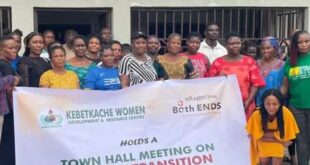By Joel Anekwe
Environmental and human rights activists have called on African nations to return to agriculture so as to avoid the huge losses to livelihood resulting from the heavy dependence upon the extractive sector.
The activists were of the opinion that despite the huge financial benefits accruing from the extractive industry, mining of natural resources especially crude oil has done more harm than good to livelihood of Africa and her people.
Jacqueline Moudeina, Chadian lawyer and human rights activist, presenting a paper in Port Harcourt, Rivers State on “Natural Resource Extraction, Livelihoods, Social Relations and Conflict in Africa” organised by University of Port Harcourt, Right Livelihood College in partnership with Health of Mother Earth Foundation (HOMEF) urged African leaders to deviate from crude oil exploration and exploitation and concentrate more on agricultural development.
Moudeina who is also the President of the Chadian Association for the Promotion and Defence of Human Rights, regretted that the advent of oil in her country has created more poverty among the common people adding that it also aggravated conflicts and social injustice.
According to the Chadian environmentalist “Africa is blessed with so much natural resources but we have to action to make these natural resources a blessing and not a curse”.
“African leaders should deviate from full concentration on oil and promote agricultural development which is also a huge blessing for the continent”, stressing “with our fertile soil we can rule the world.”
She further urged that to bring lasting peace to the warring and troubled continent, there should be strong move by African leaders and its citizens “To fight against impunity, promote good governance and management, social justice and real democracy for all.”
Earlier in his address, Nnimmo Bassey, an environmentalist and Director of HOMEF, disclosed that the Right Livelihood College is a global capacity building initiative by the Right Livelihood Award Foundation, aimed at making the knowledge of the Laureates accessible to all and thereby linking young scholars, academics and civil society organisation with the laureates, in their successful solutions to urgent global problems.
He said: “environmental hazard, corruption and political tussles have attacked the development height of Nigeria”, stated that other African oil producing countries are also suffering from environmental pollution caused by Oil Companies operating in the areas.
Bassey who also recalled recent statistic that positioned Nigeria as the 10th most polluted country in the world, said “let’s go away from extraction and exploration of oil, cut our losses and embark on Agriculture.”
In his opening remarks, the Vice Chancellor of the University of Port Harcourt, Prof Ndowa Lale, stated that the topic of the lecture, “is in tune with the realities of our situation in the Niger Delta, which is bedeviled by unremitting agitations for resources control and environmental justice.”
Represented by the Deputy Vice Chancellor of the institution, Prof Regina Ogale, Lale, noted that the “Environment of the oil-rich Niger Delta region has witnessed occasional violence that has led to loss of lives and displacement of ordinary people who are usually caught up in these agitations.”
He observed that the public lecture series organised by the Rights Livelihood College has added great value to capacity to analyse the conflict burden in the Niger Delta environment and beyond.
 PH Mundial – Port Harcourt Online Newspaper News Across The Region
PH Mundial – Port Harcourt Online Newspaper News Across The Region




